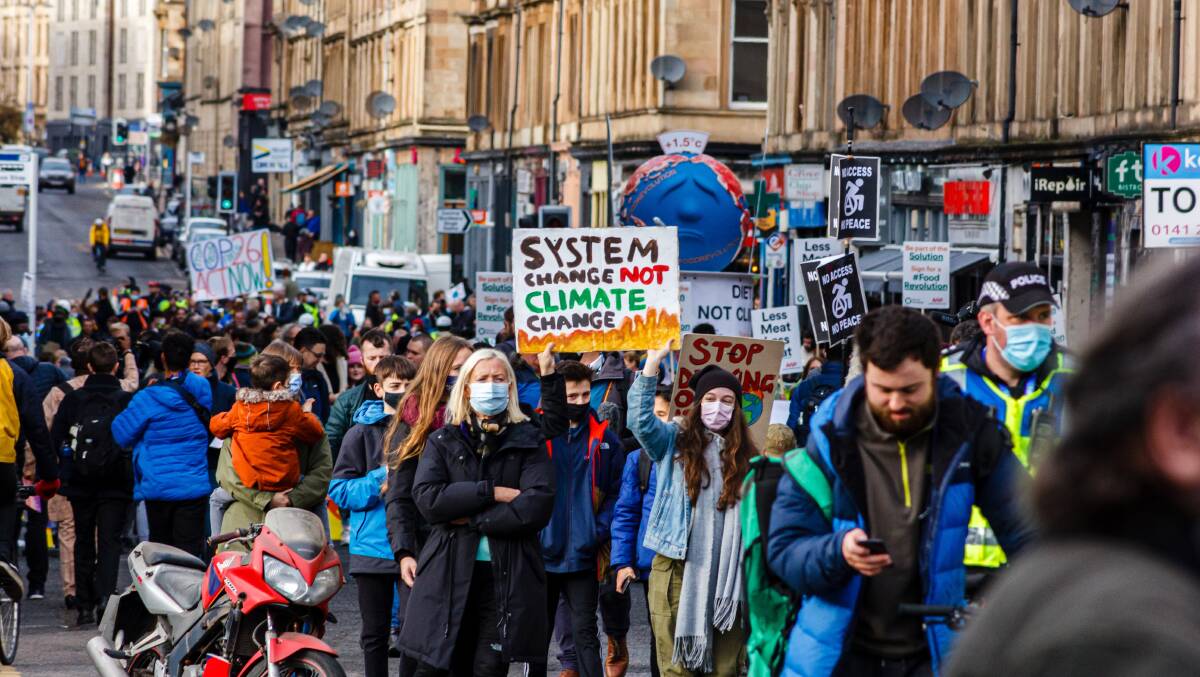
Sherlock Holmes: Don't forget the curious incident of the dog in the night-time.
Subscribe now for unlimited access.
$0/
(min cost $0)
or signup to continue reading
Inspector Gregory: The dog did nothing in the night-time.
Sherlock Holmes: That was the curious incident.
Many thousands of words have been written about COP26 in Glasgow. Attention has been lavished on the new commitments - or, in the case of Australia, old non-commitments - of leading carbon-emitting countries. The final communiqué underscored the need for a global approach. Ambitious promises were made to increase the finance available for adaptation measures, especially in developing countries.
But COP26 neither put its finger on the problem, nor found the best way forward.
We know what we need to do, and we know how to do it, too. The problem is how to pay for it. The global transition to a low-carbon economy will not come cheap. Who will finance the technological innovations? Who will fund the transition to agricultural sustainability? Who will pay for the retraining of old industries and the development of new ones? Who will support the developing countries who are the least responsible, but the most vulnerable? Who will pay for the rainforests and the reefs and the cultures now on the brink of collapse?
COP26 recognised that the climate emergency was essentially an economic emergency. But it stopped short of asking where the money was going to come from.
The most powerful lever of social and collective action we have is taxation. A progressive taxation system can reduce social inequality and support policies that reflect our collective needs and aspirations rather than just our individual wants and desires. But not everyone is paying their fair share.
Multinational enterprises (MNEs) and their affiliates are now responsible for one-third of global output, half of global exports, one-third of all GDP and one-quarter of all employment. But the levers that might have controlled these vast enterprises - local unions, environmental regulations, and national laws - are increasingly impotent. At the drop of a hat or an unwelcome legislative change, MNEs can threaten to move their operations elsewhere. Profit shifting, forum shopping, regulatory capture, and tax havens are in their DNA. In the words of Drahos and Braithwaite, two Australian scholars who have studied the complexities of global regulation for decades, it has become a race to the bottom.
As a result, MNEs pay significantly lower taxes than other corporations - let alone the rest of us. A financial shortfall of billions of dollars ends up in the pockets of Facebook, Amazon, Exxon, Nestlé and the rest. Earlier this year, the G7 reached an agreement to ensure MNEs pay a minimum tax rate of 15 per cent - still no more than half the average corporate figure. And this was nothing more than an in-principle agreement among seven countries (not including Australia).
READ MORE:
The issue is that changing how we tax highly mobile entities like MNEs is what is known as a collective action problem. The whole world has to act as one, otherwise money will simply slip through the net like water. At best, a global treaty is a long way off; at worst, it's a pipe dream.
Which is where COP26 dropped the ball. At the most momentous global conference for years, it could have sheeted home responsibility for climate change not just to individual nations, but to the corporate fiefdoms whose independence from state control is akin to that of feudal lords. MNEs are responsible for around 20 per cent of global emissions. Increasingly these are produced in developing countries, which bear the brunt of the damage while reaping few of the benefits. If the conduct of MNEs poses a major challenge, environmentally and legally, to a successful climate transition, then reorganising the global tax system might be a crucial way of addressing it.
Linking global taxation to the global climate emergency would make a big difference. It would place at the very top of the global agenda taxation reforms on which experts have been struggling to gain traction for years. It would justify progressive economic transformation in the context of the greatest collective action problem in world history. The influx of tax revenues could be specifically earmarked for the global costs of financing adaptation and mitigation strategies, supporting workers, communities, industries and ecosystems around the world.
COP26 presented a perfect opportunity to look beyond the language of the nation-state and identify the role of MNEs in climate change. At the same time, it could have secured the financial resources that in years to come will prove the real stumbling block. Coupling the environmental responsibility of MNEs with its own economic solution - call it "mnemonics"! - would have killed two giant birds with one stone. It would have been the wake-up call we so desperately need.
But, like the dog in the night-time, COP26 did not bark.
- Professor Desmond Manderson is director of the ANU's Centre for Law, Arts and Humanities.

